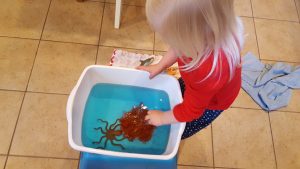Ink Like an Octopus!

To view the photo-rich magazine version, click here.
Originally appears in the Summer 2020 issue.
By Kimberly Rose Carroll Tigerström
Early exposure to science and inquiry
Inquiry mirrors the scientific process of asking questions, experimenting, and sharing ideas. By exploring, engaging, and reflecting, young children are able to practice the process of inquiry. Early childhood education teachers and students can benefit from a shift to inquiry-based, child-centered learning in their classrooms. Why? This type of learning is usually hands-on, child-led and supports multiple learning styles. By sparking children’s interest and understanding, advocates of science in early childhood education believe that the use of inquiry may lead to increased scientific literacy later in life.1 Education advocates have pinpointed a research gap for this age group, highlighting the value to society in terms of encouraging positive views about science and sustainability.2 The current data indicates that not only should science be taught during the early years, but it is perhaps the best time to introduce scientific concepts, capitalizing on the natural abilities of this developmental stage.3 Children under five are natural learners, already possessing an innate curiosity about the world. Simple introductions to this type of learning — such as the following lesson, which utilizes inquiry strategies — may allow them to form positive attitudes about science and scientific concepts.3,4 It also serves to expose this age group to important science vocabulary that will help them to discuss and master science concepts later on.
This content is restricted to subscribers only.
If you are not yet a subscriber, please consider taking out a subscription here.
If you are an existing subscriber, kindly log in or contact us at info@greenteacher.com for more information.





